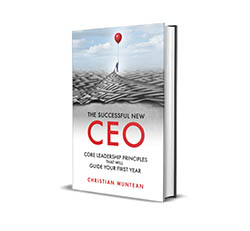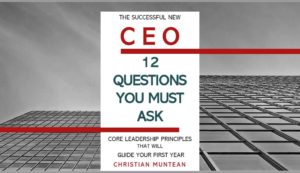The 4 Principles that Helped My Clients Grow During the Last Recession


Summary: Don’t get sucked into the head game around economic fear-mongering.
Through 2020, when the world got flipped upside down, all of my clients ended the year profitably. The significant majority also had their best year ever. Only one was in an industry that naturally benefitted from the economic conditions that accompanied COVID.
At the beginning of 2020, the waves were a little choppy for most. In fact, there were a few months where a couple thought they wouldn’t make it. But they kept their heads while many others didn’t.
They did this by following simple strategic principles.
Why am I bringing this up?
According to the news (that spring of eternally useful information), if Republicans don’t agree to lift the tax cap, we’ll soon slide back into recession. On the flip side, the news also tells us that if Democrats continue the same inflation-inducing policies, it’ll also knock us back into a recession.
Sounds like the only thing anyone knows is who they plan to blame. So don’t get sucked into the head game.
Here are some facts that you may find interesting.
Fun fact #1 about recessions: Economic tides ebb and flow regularly. From the beginning of the United States until World War II – a recession occurred pretty much every year or two.
Since World War II, the periods of growth have been longer. There is now roughly three to four years of growth in between recessions. Sometimes more, sometimes less.
While the news and politicians treat each recession as the most recent end of the world, savvy leaders are prepared for the push and pull. They are ready to benefit from the inflow and outflow of the tide.
Fun fact #2 about recessions: On average, they last less than a year. Eight to eighteen months has been the normal range for quite a while. They don’t last forever. They (usually) don’t last very long. Not once have they been the end of the world.
Fun fact #3 about recessions: It usually takes the National Bureau of Economic Research (the official recession umpire) between six to fifteen months to determine if there is a recession.
It’s a little like a weather channel that focuses on last week’s weather. By the time they call a recession – it’s either over or very nearly over.
If you are a full-grown human being, you’ve lived through many recessions. Some of which you might not even have noticed.
Might as well expect them and develop a strategy for growth during them.
Your strategy for growth regardless of the economy
The following principles are evidence-based and derived from the research of Ranjay Gulati, a Harvard Business School professor. These were the principles that guided how I advised my clients through 2020.
Principle #1: Don’t Lose Your Conditioning
Ask an athlete – stress, injury, disruption, or life distractions can cause you to back off of your training. And, as any athlete knows, it’s awful to lose your conditioning. If you aren’t familiar with the term, being “conditioned” in fitness just means that your body and mind are prepared for physical stress and challenges.
Anyone who hasn’t been to the gym or worked out for a while knows it’s hard to get conditioned. It’s physically and mentally uncomfortable. If you’ve had it and lost it – it can be a humbling journey to gain it back. It often requires lifestyle changes in terms of eating, sleeping, and so on.
A well-conditioned organization is also one that is prepared to move, ready for challenges, positioned for performance. In all cases, these following practices build and keep your company conditioned:
- Stay Aligned: Your entire organization (All decisions, habits, and behaviors) should be aligned to express your values and build towards your ultimate vision and goals.
- Fight for Clarity: Ambiguity breeds conflict. Confusion bleeds the strength of your organization. At the most basic level, make sure that everyone understands their role in the company, their core responsibilities, and what is expected of them in terms of behavior and performance.
- Use Systems: Any decision or action your organization takes on a regular basis will benefit from developing a system. At the most basic level, this is simply creating a road map or an outline for “how we do X.”
- Cut What Doesn’t Generate A Return: Don’t keep doing things that don’t bring value. Organizations often build habits that stop being beneficial over time. Or they keep pursuing initiatives that they hope and believe will work – but don’t. Know when to stop.
Principle #2: Chance Favors Only The Prepared Mind[1]:
When economic conditions change, (even in a downturn), they present a new set of opportunities. However, these opportunities don’t stay and wait for you. Success loves speed[2]. Learn to recognize opportunity. Be prepared to act.
Principle #3: Zero Your Scope:
It’s hunting season where I live. Most hunters will take their rifle out and “zero” it in. This means firing a few, careful, controlled shots at a target. Then the target is evaluated to see how accurate the shots were. That information is used to make adjustments. Then a few more shots are fired. The process repeats until all shots are on target.
None of the rounds expended above brought home game. But by carefully investing a little time and resources, the hunter ensures success when it matters.
In business, this means investing in careful experimentation. Experiment with ideas that might improve your business. Make them carefully and be controlled. Learn to interpret the results. Then adjust until you get the results you want.
Principle #4: No Air-Bubbles In Your Pipeline
Keep up your sales/marketing/business development practices. Keep evangelizing what you offer.
Most business development efforts take time to bear fruit. Because in many industries, the selling process takes time between the initial investment and the return. As a result, one of the first things to get cut in a downturn is the investment in gaining future business.
Businesses that do this put an “air bubble” in their pipeline. Perhaps they have enough work right now to see them through – but that air bubble (a gap in business) will eventually cost them.
Many businesses that “hunkered down” through most of 2020 (and survived hunkering) found that their personal recession was prolonged into 2021.
Don’t let air bubbles get into your sales pipeline.
Don’t Struggle Unnecessarily: These Four Principles Will See You Through
Every company or organization will express these four principles in their unique way. Those who do will survive and even prosper during downturns. Those who don’t tend to struggle.
You don’t need to struggle if you don’t want to.
Take good care,
Christian
[1] Louis Pasteur. From his inaugural lecture, University of Lille (December 7, 1854)
Are you interested in learning more about becoming a successful CEO? If so, get a free copy of my book The Successful New CEO. Not a new CEO? I’ve been told by “old hands” that they felt any CEO should read this. So, click here to get your copy today.
by “old hands” that they felt any CEO should read this. So, click here to get your copy today.
Let’s connect.
I’m passionate about helping leaders to create workplaces they love going to and increasing the value of the services they offer. My results-oriented approach is tailored to each client’s specific situation and needs. As a leadership coach, I have developed a wealth of resources to help you and your team grow and become stronger.
Weekly Newsletter – sign up to receive my weekly articles addressing critical leadership challenges and issues.
The Leadership Coach Podcast – In my podcast, we explore effective, high-impact, and enjoyable leadership. Subscribe.
Resources – Visit my website’s Resources page for e-books, webinars, training, and leadership coaching opportunities for you and your team.
There are 𝟭𝟮 𝗰𝗿𝗶𝘁𝗶𝗰𝗮𝗹 𝗾𝘂𝗲𝘀𝘁𝗶𝗼𝗻𝘀 to ask before accepting a new CEO position. Do you know what they are? Instantly download my free e-book here.
Find the value of your company with my free assessment tool: The Value Builder System
The Value Builder System™ is a 13-minute online questionnaire that evaluates your business on the eight factors that contribute more to its attractiveness and value. These factors are scored on a scale of 1-100. Businesses that score over 80 are likely to command 70%-100% higher value than others.
Opportunities
Free Resource: How To Accomplish More Without Doing More is a workbook I created to walk leaders through a process of helping you own your calendar, liberate your time, and still get more done. Download it for free!
Executive and Leadership Coaching: Do you feel overwhelmed? Are you not getting the results you expect from the effort you are putting in? Do you find yourself facing similar challenges time and time again? Would you like to change specific ways of relating or reacting? If you would like to experience predictable, measurable growth Contact me.
Profitable Exit Strategy Workshop: Are you a business owner or partner? Over 55? Starting to think about exiting your business or active management in the next 3-5 years?
- Curious about what your business might be worth?
- Would you like to discover the specific steps you need to take to increase its value and become highly attractive to a buyer?
- Are you planning on handing it over to family or employees and you want to ensure long-term success?
If so, contact me now
Article Categories
Popular articles

Download my free 10-page eBook:
How To Accomplish More Without Doing More:
Eight Proven Strategies To Change Your Life
Discover how to save eight hours during your workweek-even if you're too busy to even think about it. The resource every maxed out executive needs.

